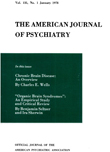On Eclecticism
Abstract
In psychiatry today eclecticism is encouraged by the wide range of therapeutic techniques available, the complex needs of patients, and the many political systems (family, school, job, etc.) in which they are enmeshed. Although it is possible to learn a variety of techniques during and after residency without an integrated theory of eclecticism the practitioner may have difficulty deciding when and how to use them. General systems theory has been suggested as a theoretical basis for eclectic psychiatry, but it has several shortcomings. The author concludes that until an adequate theoretical basis is formulated, eclectic choices must be characterized as "artistic" rather than scientific—a serious limitation in the development of practice.
Access content
To read the fulltext, please use one of the options below to sign in or purchase access.- Personal login
- Institutional Login
- Sign in via OpenAthens
- Register for access
-
Please login/register if you wish to pair your device and check access availability.
Not a subscriber?
PsychiatryOnline subscription options offer access to the DSM-5 library, books, journals, CME, and patient resources. This all-in-one virtual library provides psychiatrists and mental health professionals with key resources for diagnosis, treatment, research, and professional development.
Need more help? PsychiatryOnline Customer Service may be reached by emailing [email protected] or by calling 800-368-5777 (in the U.S.) or 703-907-7322 (outside the U.S.).



